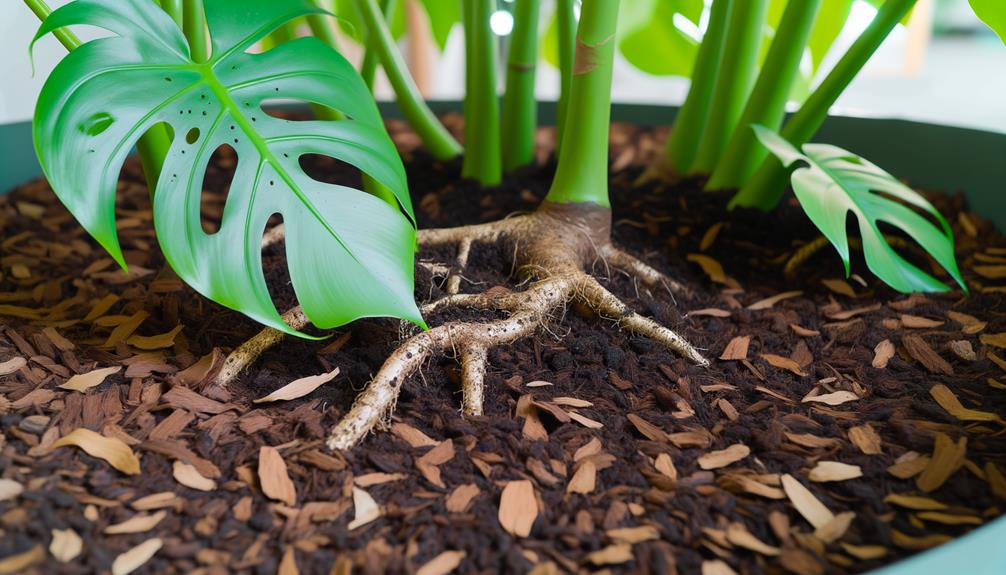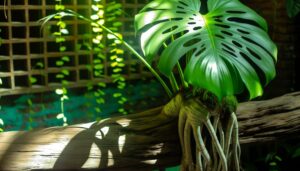Monstera Lechleriana Soil Preferences
For Monstera Lechleriana, use a well-aerated, nutrient-rich soil mix with a slightly acidic to neutral pH (5.5-7.0). Combine organic material like compost, peat moss, and perlite to promote good drainage and moisture retention.
The soil should support essential nutrients: nitrogen for leaf development, phosphorus for root health, and potassium for overall physiological processes. Avoid compact soil to prevent root rot; instead, aim for a loose, porous texture.
Incorporating premium organic matter and ensuring sufficient aeration will enhance soil fertility and root respiration, critical for robust growth. There's much more to discover about creating the perfect environment for your Monstera Lechleriana.

Key Takeaways
- Maintain soil pH between 5.5 to 7.0 for optimal nutrient uptake.
- Use a well-aerated, loose, and porous soil mix to support root respiration.
- Incorporate organic matter like compost to enhance soil fertility.
- Ensure fast drainage by adding components like perlite or coarse sand.
- Utilize organic fertilizers rich in nitrogen, phosphorus, and potassium.
Importance of Proper Soil
Proper soil is crucial for Monstera lechleriana because it directly impacts the plant's nutrient uptake, root health, and overall growth. You need to guarantee the soil has outstanding aeration and drainage properties.
When the soil is too compact, roots can't access oxygen efficiently, leading to root rot and stunted growth. Additionally, incorporating organic matter like compost or peat moss can enhance the soil structure by increasing its porosity. This facilitates better water retention while preventing waterlogging.
The presence of essential micronutrients in the soil boosts the plant's metabolic functions, ensuring vigorous foliage development. By paying attention to these soil characteristics, you can create an ideal growing environment that supports the Monstera lechleriana's physiological needs and maximizes its growth potential.
Ideal Ph Levels
To achieve peak growth for your Monstera Lechleriana, maintain the soil pH within the range of 5.5 to 7.0.
Utilize a dependable soil testing method, such as pH test strips or a digital pH meter, to regularly monitor and adjust the soil acidity.
Achieving and maintaining this pH range will support nutrient uptake and overall plant health.
Optimal Ph Range
Understanding the ideal pH range for Monstera lechleriana is crucial for ensuring its healthy growth and nutrient uptake. You should aim for a soil pH between 5.5 and 7.0. This slightly acidic to neutral range supports peak nutrient solubility and root function. Deviations from this pH range can impede nutrient absorption, leading to deficiencies and stunted growth.
Iron, manganese, and phosphorus availability are particularly sensitive to pH fluctuations. Monitoring and adjusting soil pH will help maintain a balanced environment for your Monstera lechleriana. Regularly check the pH and amend the soil with lime to raise pH or sulfur to lower it, ensuring it remains within the optimal range.
This proactive approach will promote vigorous growth and vibrant foliage.
Soil Testing Methods
Maintaining the ideal pH range for Monstera lechleriana involves using precise soil testing methods to regularly monitor and adjust the soil's acidity or alkalinity.
Employ a digital pH meter for accurate readings, as it provides real-time data and greater precision compared to litmus paper. Calibrate the meter before use to ensure dependability.
Alternatively, soil testing kits, which include pH test strips and color charts, can offer a cost-efficient solution. Gather soil samples from various areas around the plant, blend them, and add distilled water before testing.
Aim for a pH range of 5.5 to 7.0, optimizing your Monstera's nutrient uptake. Regular testing helps you maintain this ideal range, supporting healthy growth and development.
Essential Nutrients
Monstera lechleriana thrives when its soil is enriched with essential nutrients like nitrogen, phosphorus, and potassium, which support robust growth and vibrant foliage. Nitrogen is essential for protein synthesis and chlorophyll production, enhancing leaf development. Phosphorus aids in energy transfer and root formation, promoting overall plant vitality. Potassium regulates water uptake and enzyme activation, ensuring ideal physiological functions.
Here's a breakdown of these nutrient functions:
| Nutrient | Function | Impact on Plant Growth |
|---|---|---|
| Nitrogen | Protein synthesis, chlorophyll | Enhanced leaf development |
| Phosphorus | Energy transfer, root growth | Improved vitality and root health |
| Potassium | Water regulation, enzyme function | Optimal physiological processes |
Ensuring your Monstera lechleriana receives these nutrients in balanced proportions is essential to its health and aesthetic appeal.
Soil Texture
While ensuring your Monstera lechleriana receives the correct nutrients is essential, selecting the appropriate soil texture is equally important for best growth. You'll want a well-aerated, loose, and porous soil mix.
The ideal soil texture balances organic and inorganic components to facilitate root respiration and nutrient uptake. Incorporate materials like peat moss, perlite, and orchid bark to enhance aeration and water retention without compacting. These components create macro and micropores, essential for oxygen exchange and moisture regulation.
Avoid heavy clay soils, which restrict root expansion and may lead to waterlogged conditions. A soil texture that maintains structure while supporting robust root growth will optimize your Monstera lechleriana's performance in a controlled environment, enhancing its physiological functions.
Drainage Requirements
You must guarantee that Monstera lechleriana's soil composition promotes fast drainage to prevent waterlogged roots, which are vulnerable to rot. Incorporate amendments like perlite or coarse sand to improve aeration and support a healthy root system.
Ideal soil composition balances organic matter with inorganic components to sustain both moisture retention and drainage effectiveness.
Optimal Soil Composition
A well-draining soil mix, rich in organic matter and aeration components like perlite or orchid bark, is crucial for the healthy growth of Monstera Lechleriana. By maximizing the soil composition, you guarantee the plant's roots receive sufficient oxygen while preventing compaction and promoting efficient water drainage.
Consider incorporating the following elements to achieve an ideal soil blend:
- Perlite: Boosts aeration and drainage.
- Orchid Bark: Provides structure and air pockets.
- Peat Moss: Retains moisture without causing waterlogging.
These components collectively create a balanced environment, ensuring proper root development and minimizing the risk of root rot. By carefully selecting and mixing these ingredients, you'll provide your Monstera Lechleriana with the best conditions for vigorous growth and overall plant health.
Preventing Waterlogged Roots
Ensuring proper drainage is paramount to prevent waterlogged roots, which can lead to root rot and other detrimental conditions in Monstera Lechleriana.
You should utilize a well-draining soil mix, incorporating components like perlite, pumice, and coarse sand to facilitate water movement.
The container's drainage holes must be unobstructed to allow excess water to escape efficiently. Implement a bottom layer of gravel or broken pottery pieces to further enhance drainage.
Regularly monitor the soil moisture levels using a moisture meter, ensuring that the substrate remains moderately moist but never saturated.
Enhancing Aeration Techniques
Optimizing aeration in the soil mix is crucial for maintaining healthy root systems and preventing anaerobic conditions in Monstera Lechleriana. You should employ techniques that enhance soil porosity and facilitate efficient drainage.
Integrate materials that promote air circulation around the roots and prevent compaction. Consider these components:
- Perlite: Add perlite to the soil mix to increase air pockets and improve water drainage.
- Bark Chips: Incorporate bark chips to create larger gaps in the soil, promoting better airflow.
- Coarse Sand: Utilize coarse sand to enhance soil structure and prevent water retention.
These amendments guarantee the roots receive adequate oxygen, reducing the risk of root rot and promoting overall plant health.
Pay close attention to the balance of these elements to optimize your Monstera's growth environment.
Aeration Needs
To ensure healthy root development, it's necessary that the soil for Monstera Lechleriana maintains excellent aeration properties. Aeration promotes oxygen penetration, ideal for cellular respiration in root tissues. Without sufficient aeration, roots risk hypoxia, leading to root rot and overall plant decline.
Utilize a well-draining substrate, incorporating components like perlite, vermiculite, or coarse sand. These materials create interstitial spaces, ensuring air flow and preventing compaction. Monitor soil structure periodically; compaction can occur over time, reducing aeration efficiency.
Employing a soil mix with a balanced particle size distribution allows for best water retention and gas exchange. By prioritizing these aeration needs, you can foster robust root health and vigorous growth in your Monstera Lechleriana.
Organic Matter
You'll need to think about the role of organic matter in enhancing soil fertility for Monstera Lechleriana.
Incorporating nutrient-rich compost can greatly enhance soil structure and nutrient availability.
Additionally, mulching and using organic fertilizers will promote strong root development and overall plant health.
Nutrient-Rich Compost Choices
Selecting a nutrient-rich compost filled with organic matter significantly enhances the growth conditions for Monstera lechleriana. This plant flourishes when provided with compost that delivers necessary nutrients and supports strong root development. When choosing compost, consider:
- Vermicompost: Abundant in nitrogen and beneficial microorganisms, it encourages vigorous growth.
- Composted Manure: Provides a well-rounded nutrient profile, enhancing soil fertility and structure.
- Leaf Mold: Improves moisture retention and offers nutrients gradually over time.
Each of these options contributes to a well-ventilated soil environment, vital for Monstera lechleriana. The organic matter in these composts not only supplies required nutrients but also enhances soil texture and water retention abilities.
Benefits of Mulching
Improving the soil environment further, mulching with organic matter offers several benefits for Monstera lechleriana. First, mulching helps retain soil moisture by reducing evaporation rates, crucial for maintaining consistent hydration levels.
Additionally, organic mulch decomposes over time, releasing essential nutrients that enrich the soil structure. This process encourages microbial activity, which in turn fosters a healthier root system.
Besides, mulch acts as a protective barrier, minimizing soil temperature fluctuations and reducing weed growth that competes for nutrients. You'll also find that mulching improves soil aeration and drainage, creating an ideal environment for root expansion.
Organic Fertilizer Options
When considering organic fertilizer options for Monstera lechleriana, focusing on those rich in nitrogen, phosphorus, and potassium is vital to promote balanced growth. Organic fertilizers improve soil structure, enhance microbial activity, and provide essential nutrients. Look for fertilizers with a balanced N-P-K ratio to guarantee optimal nutrient availability.
Composted manure: Rich in nitrogen, it enhances soil organic matter, fostering root development and foliage growth.
Bone meal: High in phosphorus, it supports strong root systems and flowering.
Kelp meal: Packed with potassium and trace minerals, it boosts overall plant vigor and disease resistance.
Applying these organic fertilizers judiciously will promote a thriving Monstera lechleriana, ensuring it receives the macronutrients and micronutrients necessary for robust growth.
Common Soil Mixes
Different soil combinations for Monstera lechleriana often involve a blend of organic material, perlite, and peat moss to guarantee ideal aeration and moisture retention.
You'll find that a 50-60% organic material content ensures ample nutrients and microbial activity. Perlite, comprising about 20-30%, improves soil porosity, aiding root oxygenation and preventing compaction. Peat moss, comprising the remaining 20-30%, excels in moisture retention without saturating the roots.
This well-rounded mix promotes both root health and peak growth conditions. When choosing a soil blend, prioritize those with a slightly acidic to neutral pH range (5.5 to 7.0). Maintaining these parameters will significantly enhance the vitality and longevity of your Monstera lechleriana.
Potting Mix Ingredients
To create a top-notch potting mix for Monstera lechleriana, focus on incorporating premium organic material, perlite, and peat moss in specific ratios. Aim for a balanced mixture that provides sufficient aeration, moisture retention, and nutrient support.
Organic material enhances microbial activity and nutrient availability. Perlite improves drainage and aeration, reducing soil compaction. Peat moss aids in moisture retention without waterlogging.
Consider these key ingredients:
- Premium organic material: Promotes root health and nutrient uptake.
- Perlite: Ensures ideal drainage and prevents root rot.
- Peat moss: Maintains consistent moisture levels and supports root growth.
Avoiding Overwatering
Overwatering is the leading cause of root rot in Monstera lechleriana, necessitating precise moisture management to maintain ideal plant health. You should monitor soil moisture levels closely, ensuring they remain within best-suited parameters. Employing a well-draining soil mix provides an effective safeguard against waterlogging.
| Aspect | Recommendation |
|---|---|
| Soil Type | Well-draining, aerated |
| Watering Frequency | Moderate, allow drying |
| Pot Selection | Drainage holes essential |
| Environment | Humid, indirect light |
You'll need to water the plant only when the top inch of soil feels dry. Utilizing pots with adequate drainage holes prevents excess water accumulation, thereby mitigating root rot risks. Maintaining a humid environment and providing indirect light also supports the plant's overall health without exacerbating water-related issues.
Signs of Poor Soil
Several indicators can reveal if your Monstera lechleriana is struggling due to poor soil quality.
First, observe the foliage. Yellowing leaves often indicate nutrient deficiencies or poor drainage.
Second, check for stunted growth; inadequate aeration and nutrient availability can impede root development and shoot elongation.
Third, examine the soil structure. Compacted, dense, or overly dry soil disrupts root respiration and water absorption.
Key signs include:
- Leaf Discoloration: Yellowing or browning as a response to suboptimal nutrient levels.
- Stunted Growth: Limited root expansion and foliar development due to insufficient aeration.
- Poor Soil Texture: Compacted or excessively dry soil, leading to impaired root function.
Identifying these symptoms early can help mitigate long-term plant health issues.
Best Soil Amendments
Addressing soil quality issues involves understanding the most suitable soil amendments to enhance aeration, drainage, and nutrient availability for your Monstera lechleriana.
Incorporate perlite or pumice to improve soil aeration and prevent root rot by facilitating excellent drainage.
Adding organic matter such as compost or well-aged manure boosts nutrient content and microbial activity, promoting healthy root development.
Sphagnum peat moss can help maintain consistent moisture levels, while orchid bark offers a coarse texture that enhances aeration.
Worm castings provide a rich source of essential nutrients and beneficial microorganisms.
Finally, activated charcoal can prevent the build-up of harmful toxins and odors.
Conclusion
Finally, cultivating a thriving Monstera lechleriana demands careful consideration of soil specifics. Prioritize pH accuracy and nutrient requirements, guaranteeing an optimal balance for strong growth.
Select a soil composition that supports adequate drainage, averting the danger of overwatering. Utilize necessary improvements to boost soil health.
By meticulously handling these factors, you'll secure your Monstera lechleriana flourishes, displaying lively energy. Remember, correct potting procedures yield flawless plants.






